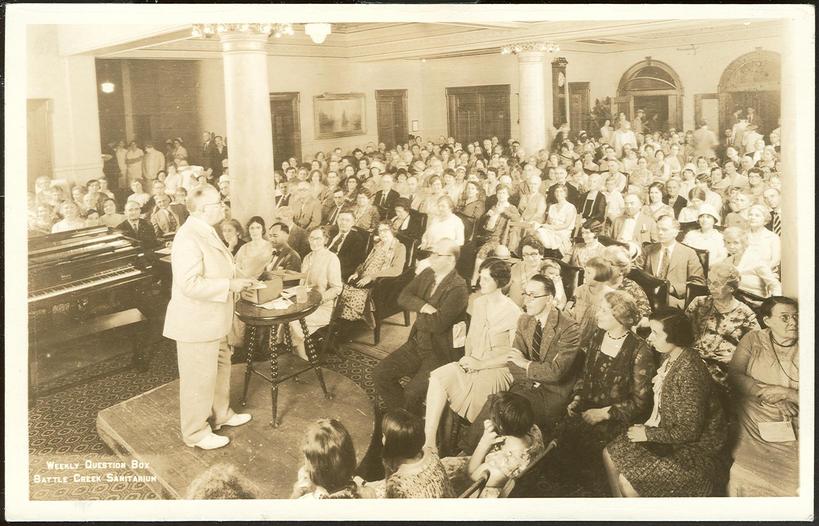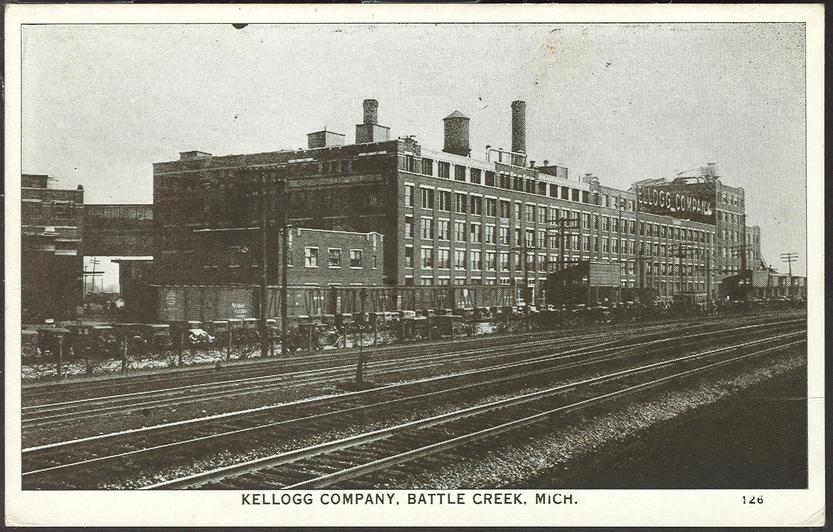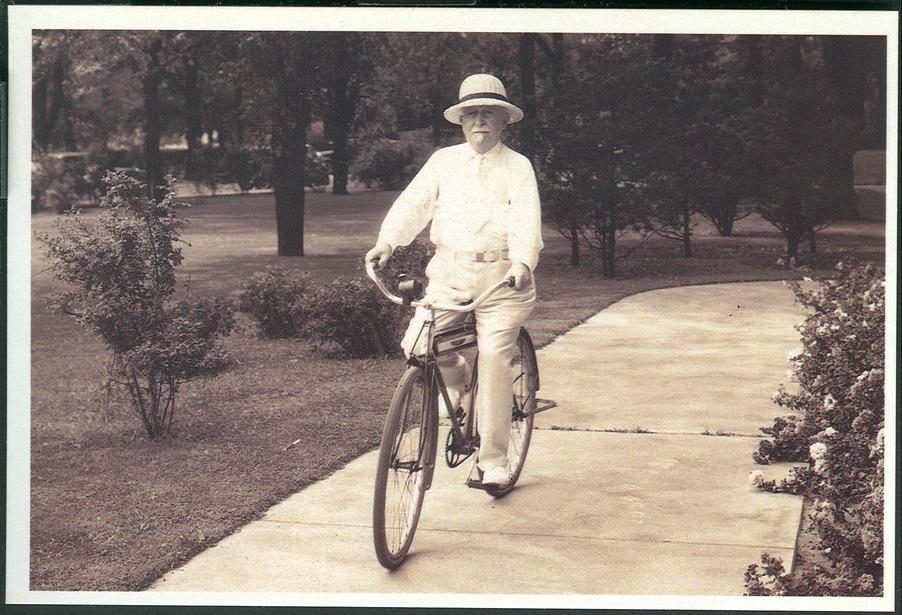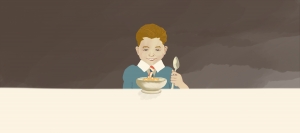#65 And This Led to Corn Flakes
Lots of people know the story of how cornflakes were created - this is the story of why.
John Harvey Kellogg was born on Feb. 26, 1852. When John Harvey Kellogg was a child, his father, John Preston Kellogg, moved his family to a small town called Battle Creek. Today, Battle Creek is also known as Cereal City. In 1855, Ellen and James White moved to Battle Creek - they were founders of the Seventh-day Adventist Church in which John Harvey Kellogg's family was a member. When John Harvey Kellogg was 12, he apprenticed at a Seventh-Day Adventist publishing house. Ellen and James White noticed him and took him under their wings.
John Harvey Kellogg and Seventh-day Adventism
Ellen G. White was a prophetess of Seventh-day Adventism. She experienced trance-states during which she was said to have received messages from God. These were called testimonies and became binding on the members of the church. Ellen had visions of health reform. Her visions basically said that Seventh-day Adventists had to take care of their bodies, as well as their souls, in order to secure their salvation. Seventh-day Adventists were supposed to eat a vegetarian diet, and use water as a cure-all (this is called hydrotherapy - back then, it was called “hydropathy”). So, in 1866, Ellen G. White opened the Western Health Reform Institute - a place for health and wellness in the style of Seventh-day Adventists.

John Harvey’s half brother, Merritt, was one of the doctors at the institute. Merritt got his MD from Trall’s Hygeio-Therapeutic College where it took only 6 months to get an MD. Merritt convinced Ellen and James White to send more of the Western Health Reform Institute’s staff to the same school for an education, and John Harvey was one of the people who went. John Harvey had wanted to be a teacher, but after going to this school, he wanted to learn more about medicine. He sought a better medical education, and he got it. John Harvey Kellogg went to the College of Medicine and Surgery at the University of Michigan, then the Bellevue Hospital in New York City. He graduated from Bellevue in 1875. In fact, he became a surgeon and he developed a special interest in gastrointestinal surgery. After graduating, John Harvey returned to Battle Creek to work at the Western Health Reform Institute. He was in his mid-twenties at this point. He took charge very quickly and changed the name of the institute to Battle Creek Sanitarium.
Easily Digestible Vegetarian Cereal
John Harvey Kellogg insisted that his patients eat a vegetarian diet. He felt that this was very important to both health and morality (and remember that he considered health and morality as tightly interconnected - you needed a pure body for a pure soul). He believed that when you eat animal foods, they rot in your body, leaving substances that are bad for you. And it’s not surprising that he would think this - John Harvey Kellogg knew the disgusting conditions of the slaughterhouses of his day - if you’ve seen and smelled rotting meat, why wouldn’t you think of it rotting in your stomach? He also didn’t agree with eating beings that think and feel. As if all that wasn't enough reason to be a vegetarian, he also believed that eating meat (or condiments, coffee, chocolate, and anything else exciting) would increase sexual arousal. If you haven't already heard about John Harvey Kellogg's views on sex, then this next bit may surprise you. He really didn't like sex. Basically, he thought it was unhealthy. He believed that the human body has a certain amount of vital force. This vital force is necessary for health, and it can be depleted. For example, too much sexual activity would deplete your vital force. (And how much was too much? He suggested that married couples should have sex a maximum of one time a month - it's no wonder all of his kids were adopted.) He thought masturbation was even worse - he was so against masturbation that he would even prescribe circumcision without anesthetics and carbolic acid on the clitoris.
So yes, John Harvey Kellogg had many reasons to push vegetarianism, but there weren't many tasty vegetarian options back then, so it was hard to make people comply. And so, John Harvey Kellogg set out to make better vegetarian options. These also had to be easily digestible, because remember that he had an interest in the gastrointestinal system. It was that drive that led to the creation of corn flakes.
As the story goes, John Harvey Kellogg and his brother Will Keith Kellogg left some boiled wheat for too long because they had to run off to deal with some emergency. They came back and continued processing the wheat that they had left out too long and created wheat flakes. Eventually, they also experimented with putting corn through the same process and created corn flakes. Corn flakes were a great creation. The other breakfast cereals of the time tended to be grain-based products that had to be boiled - they just weren't as convenient as a cereal that you didn't have to cook at all. In the beginning, people ate corn flakes with hot water or whole cream, and then eventually people used milk.
See? The "why" was much more interesting than the "how".

The Kellogg Name
But here’s a little twist to the story... When you see the name Kellogg’s on your box of cereal, it’s not actually referring to the Dr. John Harvey Kellogg we’ve been talking about this whole time.
In fact, the founder of the Kellogg Company was John Harvey’s brother, Will Keith Kellogg. The company used to be called the Battle Creek Toasted Corn Flake Company. It was founded by Will Keith Kellogg after he bought the rights to corn flakes from his older brother in 1906. The 2 brothers were very different people. The older brother, John Harvey Kellogg, was charismatic and autocratic. Later in life, he wore completely white suits that set him apart from everyone else, and he loved the attention. On the other hand, the younger brother, Will Keith Kellogg, was quietly competent. John Harvey Kellogg had the great ideas and Will Keith Kellogg had the great business sense.

After C.W. Post (who had actually stayed at the sanitarium before) had started a rival business and made a lot of money from it, the brothers really disagreed on how to run the flaked cereal business, because Will Keith Kellogg knew he could make their business just as profitable, but John Harvey Kellogg was concerned that his reputation as a doctor would be affected by the success of a commercial product. However, after Will Keith Kellogg broke with his brother, John Harvey Kellogg then wanted the rights to the Kellogg name. Unfortunately for John Harvey Kellogg, by this point his younger brother already had a strong case for holding the rights to the Kellogg name.
Although Will Keith Kellogg sent a letter to his older brother in the later years of his brother's life, the letter never reached John Harvey Kellogg, so the brothers never got reconciliation.
Special Thanks to Our Interviewee:
Dr. Brian C. Wilson - author of "Dr. John Harvey Kellogg and the Religion of Biologic Living”

